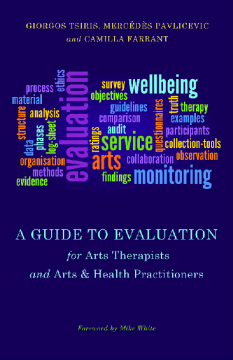
BOOK
A Guide to Evaluation for Arts Therapists and Arts & Health Practitioners
Mercedes Pavlicevic | Giorgos Tsiris | Mike White | Camilla Farrant
(2014)
Additional Information
Book Details
Abstract
Evaluation is crucial to the development and sustainability of Arts Therapy and Arts & Health practices.
This guide supports practitioners in their quest to integrate thorough evaluation procedures in their everyday practices by providing practical guidance for designing, planning and implementing bespoke evaluation projects.
Based on the authors' experience of designing and realising evaluation projects and running training workshops, a range of suggestions are offered for developing appropriate timelines and collection tools, ensuring organisational diplomacy, and managing what can be a delicate balance of truth, fact and perception.
This guide will help practitioners to evaluate their services and projects by taking into consideration the unique profile of the practice, the workplace, clients, project participants, and sectors.
By clearly focusing on value in context and reflexivity in practice to determine its meaning, we are offered appropriate evaluation tools that work from the inside out. It sensibly distinguishes between evaluation and research, and by being context-specific rather than practice-specific in assessing the utility of its methodologies, it offers entry points for practitioners from a wide range of backgrounds.
from the foreword by Mike White, Centre for Medical Humanities, Durham University
At a time when not evaluating is not an option, when we all need to improve our effectiveness and understand and demonstrate the impact of our work, this book makes essential and timely reading. For practitioners grappling with the need to evaluate but struggling to know what to measure or how to do it, this book helps us to ask the right questions, in the right order, at the right time and supports us with detailed and practical guidance on appropriate evaluation methodologies.
Jane Willis, Founder and Director, Willis Newson, UK
Giorgos Tsiris trained as a music therapist at Nordoff Robbins (London, UK), where he is now conducting his doctoral research. He is a research assistant at Nordoff Robbins where he coordinates the monitoring and evaluation portfolio. He works as a music therapist with terminally ill adults and bereaved families at St Christopher's Hospice. He is the founding editor of the open access journal, Approaches: Music Therapy & Special Music Education, and coordinator of the Research Network of the British Association for Music Therapy. Mercédès Pavlicevic trained as a music therapist at Nordoff Robbins (London, UK), and completed her doctoral studies at the University of Edinburgh's Department of Psychology with Colwyn Trevarthen. As a music therapist she has worked in a range of institutional and community settings, in Scotland, in the Lebanon and in South Africa. Mercédès was Director of the Master's in Music Therapy programme at the University of Pretoria until 2006 – this was the first accredited training programme on the African Continent. She has authored, co-authored and edited numerous music therapy publications. She is Research Director at Nordoff Robbins, and Research Associate at SOAS Music Department, at the University of London. Camilla Farrant trained as a music therapist at Nordoff Robbins (London, UK) after reading Music at Christ's College, Cambridge University and studying the cello and piano at the Royal Academy of Music. She is the founder of and music therapist for The Music Therapy Tree, an organisation that provides music therapy to vulnerable children in mainstream education. She works as a research assistant at Nordoff Robbins, and performs professionally with The Massive Violins.
In their book Giorgos Tsiris, Mercédès Pavlicevic and Camilla Farrant provide a comprehensive overview of principles, methods and skills of evaluation in the fields of participatory arts and health, and arts therapy. The book is structured in a way that will enable practitioners, managers and researchers in these fields to critically understand and implement evaluation processes, thoughtfully supported by the use of a wide range of diagrams, figures and learning tools. At a time when there are growing expectations that health and social care interventions should be underpinned by evidence, this book is an invaluable addition to the literature.
Jim Campbell, PhD, Professor of Social Work and Head of Department of Social, Therapeutic and Community Studies, Goldsmiths, University of London
